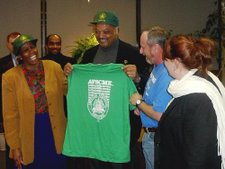
More than 20,000 faculty members at two midwestern universities are one step closer to good union contracts. Yesterday, Wisconsin Gov. Jim Doyle signed the state’s biennial budget, which includes a provision [1] extending collective bargaining rights to more than 20,000 University of Wisconsin (UW) faculty, academic staff and research assistants.
The same day, some 430 instructors and adjunct faculty at Western Michigan University (WMU) [2] voted for the Professional Instructors Organization (PIO), an [3] AFT affiliate, to represent them.
The University of Wisconsin victory capped a 40-year effort by faculty members to gain a better life by joining a union. The new law extends to 6,600 full-time, tenured and tenure-track faculty and 13,100 academic staff, which includes part-time and full-time lecturers, adjuncts, advisers, IT technicians and others. Another provision gives 3,200 research assistants the right to determine whether they want representation through the state’s first majority sign-up process.
The UW academics were the only nonmanagement public employees in the state without bargaining rights—until now. AFT-Wisconsin President Bryan Kennedy credits the continued building of workers’ political strength for the victory.
We’ve had the same legislation introduced in the three previous legislative cycles. Each time, we’ve had a chance to educate people and bring them around.
At Western Michigan University, the PIO soon will begin discussions with the WMU administration about better working conditions. Many instructors at WMU have not received any salary increase for 12 years.
Says Karl Schrock, who teaches in WMU’s School of Music:
We are confident that our organizing will help university leaders to see that part-time faculty are an essential component (along with tenure-line faculty and graduate teaching assistants) in the educational enterprise at WMU. We look forward to working with the administration to improve communication, faculty recognition and long-term planning for the university’s mission in ways that will benefit students and the university community as a whole.
These wins follow [4] several other votes in Michigan over the past two years. During that time, new unions representing contingent faculty and graduate employees have formed at Michigan State University, Central Michigan University, Henry Ford Community College and Wayne State University, all affiliated with AFT Michigan.
Article reprinted from AFL-CIO NOW BLOG: http://blog.aflcio.org/
URLs in this post:
[1] extending collective bargaining rights: http://www.aftface.org/index.php?option=content&task=view&id=546
[2] voted for the Professional Instructors Organization: http://www.aftface.org/index.php?option=com_content&task=view&id=547&Itemid=63
[3] AFT: http://www.aft.org/
[4] several other votes: http://www.aftface.org/index.php?option=com_search&Itemid=52&searchword=michigan&searchp
hrase=any&ordering=newest
 The future of the union and social justice movements lies in reaching out to college students, young workers and young voters who are energized by the election of Barack Obama.
The future of the union and social justice movements lies in reaching out to college students, young workers and young voters who are energized by the election of Barack Obama. 







